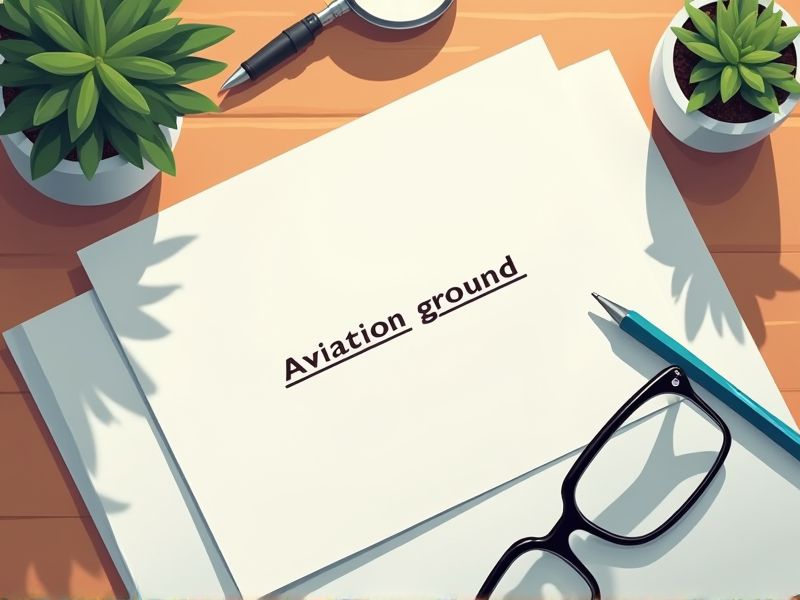
Aviation ground operations agents play a crucial role in ensuring the safety and efficiency of air travel by managing activities such as loading and unloading cargo, guiding aircraft, and handling baggage. Handling such responsibilities involves understanding logistics, safety protocols, and compliance with aviation regulations, which necessitates specialized knowledge and skills. Certain certifications are essential to equip these professionals with the expertise required to minimize risks and ensure operational excellence. Consider these important certifications you may need as an Aviation ground operations agent.
IATA Ground Operations Safety Certification
The IATA Ground Operations Safety Certification is needed because it establishes standardized safety practices crucial for minimizing accidents in aviation ground operations. Having this certification enhances an agent's credibility and expertise, leading to improved operational efficiency and safety compliance. Ground operation errors can lead to significant financial losses and safety hazards, so standardized training through certification is critical to mitigate these risks. Airlines and airports benefit from certified agents due to assured compliance with international safety standards, which increases trust and operational reliability.
IATA Dangerous Goods Regulations (DGR) Certification
IATA Dangerous Goods Regulations (DGR) Certification ensures aviation ground operations agents understand the standards for safely handling hazardous materials. This certification reduces the risk of accidents and enhances safety by ensuring proper labeling, packaging, and documentation of dangerous goods, aligning with global standards. Without this certification, there's increased potential for regulatory non-compliance, which can lead to significant fines and legal issues. Staff certified in DGR contribute to the smooth and efficient handling of cargo, minimizing delays and maintaining operational integrity.
IATA Airport Handling Manual (AHM) Certification
Obtaining the IATA Airport Handling Manual (AHM) Certification ensures standardized procedures, which reduces operational errors for aviation ground operations agents. This certification equips agents with the essential safety guidelines necessary to prevent accidents on the tarmac. Employers prefer certified agents as it reflects a commitment to high-quality service and professionalism in handling aircraft. The training provided by AHM Certification helps in efficient resource management, leading to cost savings for airlines and airports.
Aviation Security Awareness Training
Exposure to aviation security awareness training decreases the risk of security breaches by equipping ground operations agents with the skills to identify and respond to potential threats. This training ensures compliance with international and national regulations, directly affecting airport safety standards. Ground crews with proper security knowledge can contribute to a more harmonious interaction between various airport departments, reducing misunderstandings or delays. Passenger trust in airline security increases when ground operations personnel adhere to stringent security practices.
Ramp Safety and Aircraft Marshalling Certification
Ramp Safety and Aircraft Marshalling Certification ensures that aviation ground operations agents can efficiently manage aircraft movements, minimizing the risk of accidents and enhancing overall safety on the tarmac. Trained personnel can effectively communicate and direct pilots, leading to smoother operations and reducing potential delays in aircraft handling. The certification process equips agents with the necessary skills to comply with industry regulations, thus maintaining operational standards and ensuring regulatory adherence. Equipped with this knowledge, agents can identify potential hazards, ensuring quick response and mitigation of risks on the ramp.
Emergency Response and Evacuation Procedures Certification
Emergency Response and Evacuation Procedures Certification equips aviation ground operations agents with the knowledge to handle critical situations effectively, minimizing risks to personnel and passengers. It ensures agents are prepared to implement evacuation strategies swiftly during emergencies such as fires or natural disasters, thereby reducing potential harm. Certified agents contribute to maintaining the regulatory compliance standards set by aviation authorities, ensuring operational safety. The certification fosters a culture of vigilance and preparedness, enhancing the overall safety infrastructure of airport operations.
Basic Aviation First Aid Certification
Aviation ground operations agents interact with passengers and crew, making first aid certification crucial to address potential in-flight medical situations. Certification in basic aviation first aid enables these agents to stabilize an injured or ill person until professional medical help arrives. Knowledge gained through this certification fosters a safer work environment and enhances overall passenger experience. Regulatory compliance often mandates such certification to ensure airlines and ground services meet safety standards.
Airport Operations Management Certification
Certification in Airport Operations Management equips aviation ground operations agents with the necessary skills to ensure efficient and safe management of airport activities. As airports grow more complex with increased air traffic, having certified agents reduces the risk of operational errors. Comprehensive training in this certification also prepares agents to handle emergency situations effectively, minimizing potential disruptions. Possessing such certification often enhances opportunities for career advancement within the aviation industry.
Aviation Customer Service Excellence Certification
Aviation Customer Service Excellence Certification improves an agent's ability to handle passenger interactions effectively, leading to increased passenger satisfaction. This certification standardizes customer service protocols, which reduces the potential for misunderstandings and operational errors. It enhances the reputation of the airline or airport by ensuring consistent and high-quality service across all customer touchpoints. Investment in customer service training can translate into increased customer loyalty and repeat business, positively affecting revenue.
Aviation Hazardous Materials Handling Certification
Aviation Hazardous Materials Handling Certification significantly reduces the risk of accidents, ensuring that agents possess the knowledge to manage potentially dangerous substances safely. Proper certification ensures compliance with international regulations like those established by the International Air Transport Association (IATA) and the International Civil Aviation Organization (ICAO). Certified agents contribute to the protection of personnel and equipment by effectively identifying, labeling, and segregating hazardous materials. When compliance with safety standards is demonstrated, airlines experience fewer operational disruptions, enhancing overall operational efficiency.
Summary
When you obtain certifications as an Aviation Ground Operations Agent, your professional credibility increases and can enhance job prospects. Competency in specialized tasks often leads to higher job performance and efficiency. Certified skills can result in increased responsibilities and advancement opportunities within an organization. You may also see an improvement in salary prospects due to your certified expertise and value to employers.
